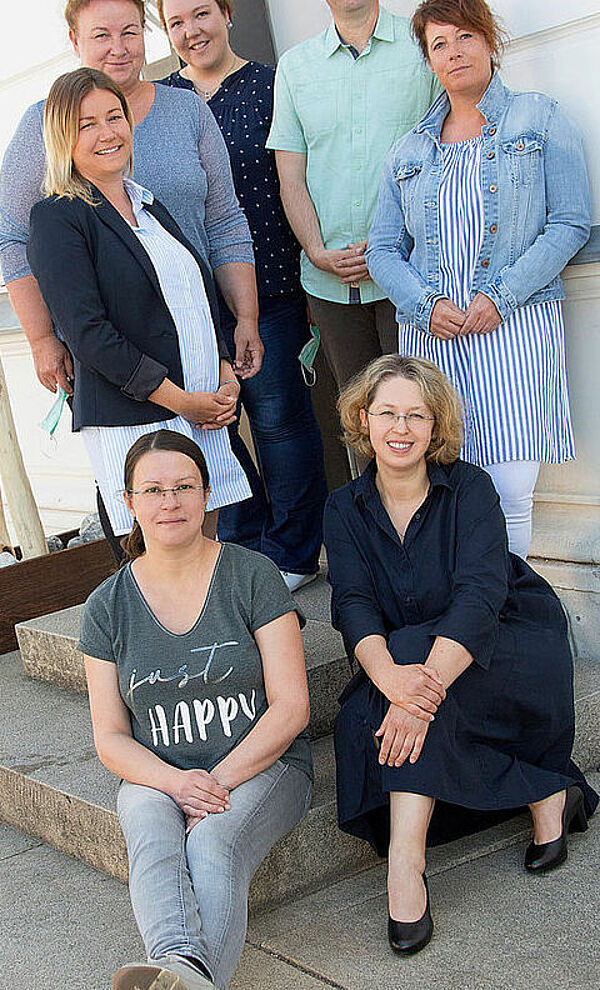Intersec-CM
Cross-sectoral care management to support cognitively impaired people during and after a hospital stay
Project overview
| Project duration: | 2017-2021 |
| Project funding: | Federal Ministry of Education and Research (FKZ: 01GL1701A, 01GL1701B, 01GL1701C, 01GL1701D) |
| Project lead: | Prof. Dr. René Thyrian |
| Project coordination: | Prof. Dr. René Thyrian |
| Consortium partner: | DZNE Rostock/Greifswald Evangelisches Klinikum Bethel Institute for Community Medicine Greifswald Ruhr-Universität Bochum |
| Project members: | |
| Registration as a clinical trial | Clinicaltrials.gov; NCT03359408 |

Background
The German healthcare system is divided into different sectors, and in many cases the transition between these sectors is not sufficiently coordinated. This leads to deficits in communication, including of care needs, between the various healthcare providers involved. Older and cognitively impaired people in particular are a vulnerable group, and for them this lack of organization of the transition between sectors is often associated with poorer treatment outcomes. The risk of being readmitted to hospital and moving into an inpatient residential and care facility is also increased.
Aims of the study
The aim of the study is to investigate whether the transition between hospital and outpatient care can be improved. To this end, specifically qualified study staff will create individual care and treatment plans based on the concept of dementia care management. The test subjects will be actively supported in the implementation and execution of these plans.
Procedure
In order to determine the needs of the test subjects, information is collected in various ways. The screening carried out by the study staff in the hospital already contains important information such as the Mini Mental Status Test and socio-demographic information. In a personal interview, information is collected, e.g. on the home care situation, the use of aids and everyday ability. Information on medication and diagnoses is extracted from the respective patient files. After this survey in the hospital and the gathering of information, the test subjects are assigned to the intervention or control group. On the basis of the information collected, recommendations for action based on the identified needs are compiled and issued with the help of technology. While still in the hospital, the intervention group receives initial support by adding a selection of information and recommendations to the patient file. The control group receives the care and nursing provided in the current health system (care as usual) over the entire study period. After discharge from the inpatient setting back to home, the intervention group receives a home visit from the study staff within 2 weeks. The care situation at home is evaluated and the recommendations for action are discussed, whereby new needs may arise at home that the test subjects had not previously considered. These are integrated directly into the conversation by the study staff and, ideally, dealt with immediately. Until the first follow-up visit, the study staff is available to answer questions and provide support in implementing the recommendations for action. After 3 and 12 months, a follow-up home visit will be carried out in both study groups, during which, in addition to the data collected at baseline, any information that had to be omitted due to the special situation in the hospital can be requested.
Expected results
The results of the study will initially describe the group of older, cognitively impaired people who are admitted to hospital as inpatients. It will also be checked whether the dementia care management that has already been evaluated can be profitably integrated into the discharge process. The main outcomes chosen to reflect the success of the study are hospital readmissions, moving into a residential and care facility and the assessment of the ability to manage activities of daily living. It is expected that the intervention and control groups will differ statistically significantly in these three points in particular. If these assumptions are confirmed and Dementia Care Management proves to be effective in this implementation for the hospital setting and the associated discharge, the aim is to incorporate it into standard care.

Contact
Publications
Boekholt M*, Afrin D, Cardona M, Dornquast C, Grond M, Haberstroh J, Hoffmann W, Michalowsky B, Schumacher-Schönert F, Stentzel U, van den Berg N, Vollmar H, Thyrian J. Gesundheitsversorgung der Zukunft - Erkenntnisse und Strategie der (Demenz-) Versorgungsforschung. (Übersichtsartikel) ZEITSCHRIFT FUR GERONTOLOGIE UND GERIATRIE. 2020. (In Press) DOI: 10.1007/s00391-020-01802-6
Nikelski A*, Keller A*, Schumacher-Schönert F, Dehl T, Laufer J, Sauerbrey ,, Wucherer D, Dreier-Wolfgramm A, Michalowsky B, Zwingmann I, Vollmar H, Hoffmann W, Kreisel S, Thyrian J. Supporting elderly people with cognitive impairment during and after hospital stays with Intersectoral Care Management [intersec-CM]: study protocol for a randomised controlled trial. (Originalartikel) TRIALS. (open access) 2019; 20(1):543. DOI: 10.1186/s13063-019-3636-5
Schumacher-Schönert F*, Wucherer D, Nikelski A, Kreisel S, Vollmar H, Hoffmann W, Thyrian J. Das Entlassmanagement deutscher Krankenhäuser für kognitiv beeinträchtigte, ältere Menschen – ein Scoping Review. (Originalartikel) ZEITSCHRIFT FUR GERONTOLOGIE UND GERIATRIE. (open access) 2020. DOI: 10.1007/s00391-020-01732-3
Lectures/posters
Boekholt M, Schumacher-Schönert F, Nikelski A, Chikhradze N, Vollmar H, Hoffmann W, Kreisel S, Thyrian J. Intersektorale Versorgung kognitiv eingeschränkter Personen. (Poster) Tagung2020: Wohnen und Gesundheit im Alter; 2020 Feb 14; Vechta.
Thyrian J. Unterstützung älterer Menschen mit kognitiver Beeinträchtigung während und nach dem Krankenhausaufenthalt:. (eingeladener Vortrag) TIGER-Workshop des Bundesverbands Geriatrie e.V. zur transsektoralen Versorgung geriatrischer Patient*innen im Übergang vom Krankenhaus nach Hause; 2020 Sep 01; BV Geriatrie (online).
Schumacher-Schönert F, Hoffmann W, Thyrian J. Das Entlassmanagement deutscher Krankenhäuser im Umgang mit kognitiv beeinträchtigten, älteren Menschen -ein Scoping Review. (Vortrag) 18. Deutscher Kongress für Versorgungsforschung (DKVF); 2019 Okt 11; Berlin. In: dkvf2019.de/wp-content/uploads/sites/40/2014/08/DKVF2019_Programm_RZ_170919_WEB.pdf. 179
Schumacher-Schönert F, Hoffmann W, Vollmar H, Kreisel S, Thyrian J. Supporting elderly People with cognitive impairment during and after Hospital stays: Intersectoral Care Management [intersec-CM]. (Poster) PhD-Retreat; 2017 Okt 19; Mannheim.
Schumacher-Schönert F, Hoffmann W, Vollmar H, Kreisel S, Thyrian J. Forschung für Menschen mit Demenz im intersektoralen Gesundheitssystem; Krankenhaus - Hausarzt - Häuslichkeit | Supporting elderly People with cognitive impairment during and after Hospital stays: Intersectoral Care Management [intersec-CM]. (Vortrag) 16. Deutscher Kongress für Versorgungsforschung; 2017 Okt 04; Berlin.
Thyrian J. Von Pontius zu Pilatus: Lücken und Schnittstellenprobleme in der medizinischen und pflegerischen Versorgung von Menschen mit Demenz - aktuelle Herausforderungen und innovative Antworten. (eingeladener Vortrag) Vernetzungstreffen: Brücken bauen; 2019 Dez 06; Ministerium für Arbeit, Soziales, Gesundheit , Frauen und Familie des Landes Brandenburg, Potsdam.

